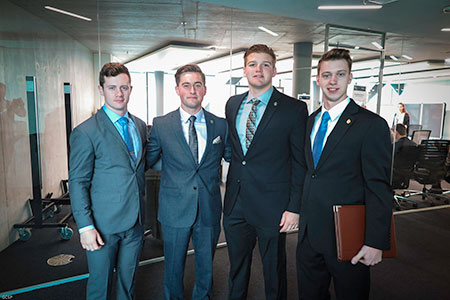Four midshipmen recently competed at the Atlantic Council’s European 9/12 Cyber Challenge in Geneva, Switzerland. The USNA team took tops honors amongst all-American and all-military teams and finished second in the world.
 |
| Midshipmen 1st Class Joe Dinkel, Zac Dannelly, Bill Young and Max Goldwasser took second place in the Atlantic Council's European 9/12 Cyber Challenge |
The Naval Academy’s team was comprised of Midshipmen 1st Class Zac Dannelly of Louisville, Ky., a Gates-Cambridge scholar; Joseph Dinkel, of West Lafayette, Ind., a Schwarzman scholar; Max Goldwasser of Atlanta, Georgia, a future naval information warfare officer, and Bill Young of Arden, N.C., a future fellow of University of Virginia’s computer science graduate department.
After the USA-based challenge, Dannelly, Dinkel, Goldwasser and Young sought to garner an even greater understanding of cyber-connectivity and internet-security with worldly perspective.
The Atlantic Council’s Cyber 9/12 is an annual cyber policy competition challenging students to develop globally nuanced policies that respond to the myriad of insecurities that exist in our increasingly binary, yet complexly connected world. With the purpose of developing mindful, technical leaders that will take up the torch and bring light to the cyber realm, the Atlantic Council creates fictional cyber catastrophes. These challenges offer stress tests to competitors who must propose creative, cogent policy alternatives in response.
In the U.S. challenge, the Naval Academy worked well in known waters: the catastrophe came from an attack on military-grade Global Positioning Systems. In Geneva, the challenge arose first in small-scale Serbian commercial, outward-facing internet-sites. The midshipmen sought not to overreact as they kept tactical-level responses with private companies, provided governmental aid, and preempted policy-makers to outline proportional responses to cyber attacks.
The European judges took well to the Naval Academy’s multi-pronged response, but cautioned the team to recognize that Europe writ large does not work under the hierarchical structure of the American government.
From this critique, the midshipmen adapted to a battlespace. The intelligence report in the second round upgraded the threat as the cyber-attacks breached superficial networks and caused a detrimental electric surge that took down power grids not only in Serbia, but neighboring states such as Hungary as well. Dannelly led the team by altering the American mindset.
“We need to be more malleable,” he said. “Our response to this crisis must establish multilateral support from the EU, NATO, and the Council of Europe. This energy crisis is more than just a Serbian problem. This is problem that hurts the whole of Europe.”
In the final round, facing down a panel of seven experts in cyber security, law, and governance, the Naval Academy delivered. Conceding only to King’s College’s finest, the Naval Academy humbly accepted the silver medal.
The international competition consisted of 30 teams from institutions around the globe, including the Geneva School of Diplomacy, the Diplomatic Academy of Vienna, Budapest University of Technology and Economics, Science Po Paris, Tallinn University of Technology, the Swedish Defense University, and the American Air Force Command and Staff College.
Speaking for the group, MIDN 1st Class Max Goldwasser found the Atlantic Council’s Cyber 9/12 to be a “mentally expansive experience.” Three of the four members of this team stand tall as upcoming graduates of the Naval Academy’s first class of cyber operations majors (Dinkel is the token English major. He hopes to be an honorary graduate of the first cyber operations force).

Go Navy!
ReplyDelete